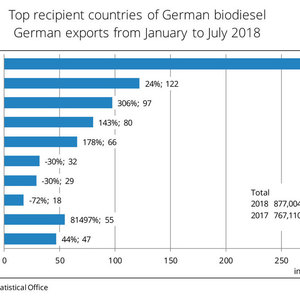German biodiesel exports hit record high in first half of 2018

October 2, 2018
BY UFOP
In the first six months of 2018, German exports of biodiesel surged more than 14 percent to 877,000 metric tons (263.3 million gallons) compared to the same period a year earlier. Just less than 88 percent of this tonnage was marketed within the EU-28. This was up 7.5 percent from the year-earlier period.
The Netherlands remained the primary recipient country of German biodiesel despite a 10 percent decline in imports to 288,800 tons (86.7 million gallons).
By contrast, Poland's orders for biodiesel of 121,800 tons (36.6 million gallons) were up around one fourth from the first half of 2017.
Advertisement
Advertisement
Quadrupling its imports, Austria outpaced Belgium and moved into third place, although Belgium more than doubled its biodiesel imports.
However, the U.S. recorded the biggest growth in imports, absorbing 54,670 tons (16.4 million gallons). In same period last year, U.S. imports were extremely low at 67 tons (approximately 20,000 gallons).
According to Agrarmarkt Informations-Gesellschaft (mbH), Sweden and Switzerland also imported considerably more German biodiesel than in the reference period.
Advertisement
Advertisement
By contrast, biodiesel shipments to France, the Czech Republic and particularly Denmark declined. Demand from Denmark crashed 72 percent to around 17,600 tons (5.3 million gallons).
The Union zur Förderung von Oel- und Proteinpflanzen (UFOP) has underlined the competitive advantage the German oil mill and biodiesel industries have over the rest of Europe and the important contribution they are making towards safeguarding German and European rapeseed production.
The association said that although the actual share of rapeseed oil-based biodiesel in the entire biodiesel market was unknown, it could be indirectly deducted from the utilization of rapeseed processing capacities. Nevertheless, UFOP has expressed fears that oil mill changeovers from rapeseed to soybean processing cannot be ruled out, depending on feedstock costs and where technically possible. The reasons are large global supply and market distortions following the tariff conflict between the U.S. and China.
UFOP has pointed out that the GMO soybean oil that would accumulate would have to be utilized for engineering or energy-related uses, unless it would be possible to sell the oil outside the EU‑28 for food purposes.
Related Stories
Montana Renewables LLC has delivered its first shipment of 7,000 gallons of SAF to Dearborn, Michigan's Buckeye Pipeline facility. From there, the fuel will be transported to the Detroit Metropolitan Airport via pipeline for use by Delta Air Lines.
NYC took a monumental step towards clean air and a sustainable future on Jan. 11 with the grand opening of the city's first retail fuel station dispensing renewable diesel. The project is a collaboration between Sprague and Sonomax.
The USDA on Jan. 11 awarded $19 million under the Higher Blend Infrastructure Incentive Program. The grants will support projects in 22 states to expand the availability of higher ethanol and biodiesel blends.
Jet Aviation partners with World Fuel Services to offer SAF in Bozeman, Montana, and Scottsdale, Arizona
Jet Aviation announced on Dec. 22 that it has signed an agreement with World Fuel Services to secure and offer sustainable aviation fuel (SAF) on-site at its FBOs in Bozeman, Montana, and Scottsdale, Arizona, effective immediately.
Neste has partnered with Coleman Oil Company, a leading provider of fuels, biofuels, lubricants, and related products, to enable cities and businesses to have easier access to Neste MY Renewable Diesel in the state of Washington in the U.S.
Upcoming Events










